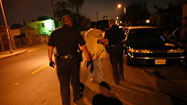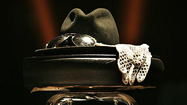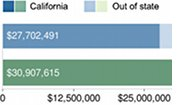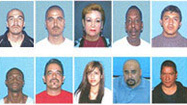Teacher responses to the 2010 release
The following is a list of teacher responses to their "value-added" ratings during the intial release in 2010. See the most recent responses »
The Times gave LAUSD elementary school teachers rated in this database the opportunity to preview their value-added evaluations and publicly respond. Some issues raised by teachers may be addressed in the FAQ. Teachers who have not commented may do so by contacting The Times.
|
|
 Delicious
Delicious
|
 Digg
Digg
|
 Facebook
Facebook
|
 Twitter
Twitter
|





• Your article substitutes simple answers (one type of assessment) to complex questions for the more detailed investigation necessary to produce positive results.
• By focusing upon a single criteria (test scores) to classify teachers’ “effectiveness,” your article will result in continued pressure upon teachers to “teach the test.” It does not address the more important issues of student motivation, parent involvement, or the students’ retention of knowledge. Some teachers “teach the test,” and see a rise in their students’ test scores. Yet, those same students demonstrate little retention of those skills beyond the test. In fact, many students enter the next grade level unable to complete the most basic assignments. Their performance is clearly incongruent with the test scores from the previous year. Yet, retention of knowledge, or the ability to apply that knowledge (two essential components of effective teaching), are completely ignored by your article.
• Your article fails to track the students further than fifth grade. The goal of educating our students is to prepare them for their best possible future. You need to research the continuing education of the students.
• You state that research shows that “teacher effectiveness is the single most important factor in a child’s ability to learn.” Please cite that research, and as effective journalists, also discuss the plethora of research that cites other issues such as home environment, nutrition, parents’ education levels, & socio-economic status, have a great impact upon a child’s ability to learn.
• After 22 years of teaching, your article represents the first time that the L.A. Times has mentioned my name. It has used this skewed data to judge my effectiveness as a teacher. Yet, the L.A. Times has ignored the many students who return to my school each year and tell me that I’ve been one of their most influential teachers, the many students who’ve left our Title I community to attend colleges (including M.I.T., NYU, UCLA, etc.), and the numerous projects I’ve undertaken with students to provide motivation and an ongoing desire to learn.
• In assessing my “effectiveness,” the L.A. Times has ignored a number of professional accomplishments which demonstrate the effectiveness of my teaching:
o As a result of my work with students, I was awarded the Historical Society of Southern California’s highest honor, the Joseph O’ Flaherty Distinguished Teaching Award.
o I have appeared in Who’s Who of American Teachers (nominated by former students for the positive effect I’ve had upon their education) three different occasions. Additionally, I earned very high scores while becoming our school’s only National Board Certified classroom teacher.
o I’ve collaborated with numerous public institutions to bring greater educational opportunities to our Title I students. The Skirball Cultural Center, the Geffen Playhouse, the San Fernando Valley Audubon Society, the Center for Civic Education, the UCLA ArtsBridge program, the Art Center College of Design, curators at the Autry National Center & the Huntington Gallery, the Zimmer Children’s Museum, the NoHo Arts Festival, Azusa Pacific University, the UCLA History-Geography Project, the UCLA Writing Project, former school board member Jon Lauritzen, the L.A. County Natural History Museum, Tree People, Burbank DWP, the Digital Divide Conference at UCLA, Windows-on-our-Waters Environmental Education, the Children’s Nature Institute, and the Autry National Center have acknowledged my accomplishments developing effective classroom practices.
o While working with the Center for Civic Education, I was asked to collaborate with a number of other educators to write the Scope and Sequence linking their National Civics Standards to the California State Social Studies Standards. In addition, I brought Project Citizen to our school. This project encourages students to make a positive difference in society by using a multi-step process to identify a problem, find and review potential solutions, and then create an action plan to implement the policy. Through this program, my students, who called themselves the Positively Green PowerShifters, made short- and long-term proposals to implement policies converting Toluca Lake Elementary School into an energy efficient prototype. Working with a graduate student from the UCLA ArtsBridge program, the Positively Green PowerShifters made their project into a film to better inform the community about ways to take action locally to reduce global climate change.
o I have often been asked to share teaching insights with other educators including the presentation of curriculum the Center for Civic Education, the Skirball Cultural Center, LAUSD, the UCLA History-Geography project, the UCLA Writing Project, Center X at UCLA, & Constitution Day conferences. In addition, I have worked as a mentor teacher for LAUSD, and a master teacher for the ACT program of the California University of Northridge. I was appointed as the Articulation Coordinator in LAUSD’s District B (North Hollywood) creating links between middle and elementary school teachers in the area (funded by an Annenberg Grant), and helping to organize a Summer Bridging program to help elementary students make the transition to middle school. Also, I worked on the development of student curriculum detailing the history of jazz for the Thelonious Monk Jazz Institute’s website, as well as the creation and testing of LAUSD’s new model curriculum, “United States History & Geography: Making a New Nation.”
o I’ve initiated and edited a monthly school newspaper (The Toluca Lake Times), a school web page, a school recycling program (Cycle-of-Life Club), an alumni volunteer program, an ArtsBridge program utilizing graduate students from UCLA, a school-wide basketball tournament, and numerous outreach programs with local museums and environmental organizations.
o I am a firm believer in integrating curriculum to provide students with important real-world connections. I have led students in the creation of a number of performances utilizing the arts to immerse his pupils in the curriculum. Students learned about literature and social studies while performing “Tom Joad.” This play incorporated the music of Woody Guthrie with aspects of John Steinbeck’s The Grapes of Wrath. Students wrote and performed monologues voicing the concerns of individuals from the classic novel. After viewing this performance at the NoHo Arts Festival, Lee Baker of the Community Redevelopment Agency brought the students into a studio to film their play for public access. Other performances created by my students include “The Wizard of Paz” (integrating aspects of Don Quixote with The Wizard of Oz), “Another Christmas Carol” (a modern interpretation of the Charles Dickens’ classic in which Scrooge is now an energy baroness), Harlem Jazz (a historical recounting of the development and influence of jazz and blues throughout American history), “Now Let Me Fly” (50th Anniversary of Brown vs. the Board of Education), and the creation of animated films with the Zimmer Children’s Museum’s youTHink program. My students also wrote and performed a Toluca Lake Holiday. This musical production presented a history of the local community as an extension of the Community Treasures Project sponsored by Thomas Brothers Maps. During the Community Treasures project, students read local history, researched the archives of a local newspaper (The Tolucan), and took numerous trips around the neighborhood to conduct interviews and photograph important sites for this project. Their finished work was displayed at the school and at a local art gallery in the NoHo Arts District.
o In 2002, my class won a nationwide contest with the Peace Corps enabling his students to speak directly with their pen pals in Romania. Esteemed actor and director, Ed Begley, jr. has twice welcomed my students to view his play, Cesar and Ruben (about Cesar Chavez & Ruben Salazar) and conduct exclusive interviews with the cast (published in the school newspaper). My students’ poetry is annually displayed at the Japanese Community and Cultural Center in Little Tokyo. In 2008 and 2009, I was awarded a Keeping History Alive grant from Azusa Pacific University. This grant funded his students’ participation in the National Endowment for the Arts’ Big Read of Jack London’s The Call of the Wild. This fine project integrated history, geography, science, writing, and the arts. The project included a guided tour of the Jack London papers at the Huntington Library by curator Sara Hobson. The project culminated with the creation of a student-made film, The Call of the Past. This film portrayed Buck, the protagonist from The Call of the Wild, overcoming a variety of fictional challenges as he travels to several salient moments in American History: aboard Christopher Columbus’ ship the Santa Maria, in Tenochitlan at the time of Hernando Cortes’ invasion, in Colonial Jamestown, with French fur traders along the St. Lawrence River, at Plymouth Rock, in New Amsterdam, with George Washington crossing the Delaware River, escaping along the Underground Railroad, and visiting President Barack Obama in the White House. Writing these stories and creating this film helped students gain a better understanding of these important events in American history. .
• Your article gives those unfamiliar with public schools, the idea that the “value added” methodology is something new that has been ignored by schools in the past. Yet, for many years my school has made that data available to teachers and provided many hours of professional development to help teachers enhance their instruction. Had you taken the time to effectively research your topic, you would have found this information. Journalism, the fourth estate, is a great responsibility. Effective journalists thoroughly research their topic, evaluate alternative perspectives, and present potential solutions. Unfortunately, your article failed accomplish these tasks.
- Dennis Hagen-Smith
Toluca Lake Elementary
8-18-10
August 18, 2010 at 8:15 p.m.
I believe that American students must be well educated in order for our society to continue. I believed it so strongly that I became a teacher. Moreover, I believed it so strongly that I became a teacher who obsesses over my daily performance and how my actions affect my students. In other words, I am conscientious. Perhaps my naiveté and grand dreams of working toward a better educated American society combined to make me a bit idealistic, but I never imagined the reality I would encounter as a teacher: unreceptive students ranging from those coming from mildly abusive or neglectful homes to those traumatized by tragedies most of us cannot imagine, parents who are either uncooperative or disinterested, cutbacks, fear of layoffs, loss of support staff, and unfunded state and federal mandates. Even my pay has been erratic due to the payroll software changes. The discrepancy in my pay is so abysmal that I fear I will be unable to have the situation rectified. Conversely, I have also experienced thoroughly engaged students who have come to school eager to learn and parents genuinely invested in their children’s education. These rare occurrences keep me motivated.
I am also a veteran of the first Gulf War and currently an Army Reservist. I mention this because I have been a teacher, employed by the LAUSD since 2001, but I have only spent seven years in the classroom due to military mobilizations. I started as a first grade teacher until my first mobilization in 2003. In 2005, I returned to the classroom when my mobilization ended as a fourth grade teacher. Just as I was gaining momentum, I was mobilized again (May 2009 to May 2010.) So my teaching career has been impacted by my military service, but there is no room for that data in your statistics. The reality of the affect of my military service on my teaching career is that I miss portions of the year and actually missed the administration of the standardized tests of the last school year for which data was collected. Would an asterisk be appropriate next to my name in your database denoting that a substitute teacher completed the year and administered the test? The flaw in your data is that it gives no human allowances in a very human situation.
Admittedly, teaching has its perks, but it is becoming increasingly difficult to offset the hardships with the benefits of teaching. Now, I discover that my name and specific performance will be printed in your paper. I wonder if any other state employees have been subjected to this. I know there was a piece some years ago about the job performance of certain police officers, but were they and their specific performance reported? Did they suffer this indignity? If this story sells papers will others be subjected to this scrutiny? My salary is on public record, and I will ultimately use this experience to better myself as a teacher, but I feel your publication has crossed the line by naming individuals in this manner. I suppose my naiveté has gotten me again for I expected more from the Los Angeles Times than this sensationalized piece constructed obviously to titillate. Ironically, I have used your paper in my classroom by incorporating it into my social studies and writing curriculum. I will rethink this practice.
I fail to see how your data can be practically applied to benefit teachers and ultimately students, but as I said, I will find a way to utilize this experience to better myself as a teacher or as we say in the military, I will "overcome and adapt."
August 18, 2010 at 7:34 p.m.
There are so many measures of a child's progress over a period of a year.....many students arrive far below basic, so for them to progress a few points, may represent a more significant gain than meets the eye. I personally enjoy working with children who may be facing challenges, be they academic or behavioral.....I have had many successes with just such children resulting in improved work production in the classroom, healthier social relationships, including improvement in behavior at school outside the classroom. We need to be very careful about framing the image we have,of the teacher AND the student, in such a narrow minded manner.....we risk the loss of the panoramic view that is necessary to really see the whole picture. I am quite surprised to see the results reported here since every year that I have received the District report card, my classes have been reported to me as above the District and the State as well.
August 18, 2010 at 7:27 p.m.
This data is helpful to me. However, it belongs at my school site and with LAUSD, not in the hands of a biased publication with its own political agenda and motivation. It is unfair for you to publish our names with this data, which is only evidence of one component of our practice as teachers. What does the Times, and specifically the reporters who went so far out of their way to make this information available to the public, think will be gained by this? Was it necessary to publish our names and ratings (by a controversial data analyzing model)? The same information could have been presented by school, with teachers in each grade level simply identified by a letter or number.
What the Times has done is personal, and I feel my rights and privacy have been violated. I have contacted the ACLU and am awaiting a response. What a shame that the Times chooses to violate the privacy of professionals who give their students so much more than academics, who are advocates for them, and who provide a safe learning environment for them on a daily basis. Professionals who have had furlough days resulting in paycuts, health benefit cuts, less support on the school site, larger classes, and who are forced to spend their own money to get necessary items for their classrooms are now being judged by a mostly unqualified public. I teach third grade, a grade where test scores generally dip due to the new and rigorous curriculum. I also teach the students who are learning English. These factors affect their progress. I am absolutely horrified at your lack of journalistic integrity. Needless to say, I have canceled my subscription and will cease using the LA Times in my classroom. I owe my students access to a newspaper which reports the news in an unbiased manner. I will use other publications which demonstrate competent reporting and journalistic ethics.
August 18, 2010 at 6:20 p.m.
I feel that I am an effective teacher and try to build confidence and encouragement to students to help empower their learning. Like all dedicated teachers, I know that I have room to improve. I am not sure exactly how to interpret these test results, and specifically, how I can apply them into the classroom. Without further explanation, guidance and discussion, these results do not provide anything to make improvements.
While I don't want to belabor the point, it is also important to take into consideration some of the realities of my classrooms. For example, did the results take into account that I had five student teachers during this time period, or that I had extra students in my classroom because of combination classes, or have changed grade levels many times and have taught all grades K - 5 because of seniority?
I think this is a good start to help teachers if it is used in a positive manner and we are able to provide teachers with the resources needed to make them better.
August 18, 2010 at 6:10 p.m.
Teachers of split grade levels realize that there are too many variables beyond their control such as sending one grade level out to another teacher for Open Court Reading (English) for over two hours a day. This, and other factors such as emphasizing reading and writing for a purpose and not necessarily for test preparation and making sure that all students receive a well rounded education in all areas such as Science, Art, Social Science, PE, Health, Technology, etc. skew data. I guess I should have given up on programs and such as:
•Los Angeles County Office Of Education's 5 Day Outdoor Science School in the San Bernardino Mountains which for many was their first trip outside our urban city and home and fomented an appreciation for nature and a love for Science
•Santa Monica's Heal-the-Bay program which taught my students the effects of pollution and how all of us can make a difference
•Trips to LA’s diverse museums such as MOCA, LACMA and the Getty which instilled in them an appreciation for different mediums of art and possibly planted a seed for a future artist who may not be drawn into school by the other standard curriculum
•Our model school garden which taught my students about healthy eating choices and how being good to “Mother Earth” could reap you many benefits
•Inviting volunteer fitness trainers to exercise with my students to help combat childhood obesity
All of these programs and many others I thought were exposing my students to areas that would help them obtain life skills that will assist them in being contributing members of tomorrow’s world. Does this have any added value? If I had taught Math and English all day to the exclusion of all other academic subjects and had my students scored higher on standardized tests, I would have been deemed a better teacher according to your standards.
Mr. Mercado, NBCT-score “Average”
August 18, 2010 at 5:39 p.m.
This is only one piece of the puzzle, albeit one that has been missing for far too long. The ability to teach well is a complex matter; you need sensitivity and adaptability, tenacity and determination, empathy and kindness, brains and devotion - and that's just for starters!
Anne Afzali, Literacy Coach, Broad Avenue Elementary School, Wilmington
August 18, 2010 at 5:31 p.m.
Judging a teacher's effectiveness based on scores from one particular standardized test is a ridiculous idea - especially when that test does not actually asses critical thinking or problem solving skills that are relevant to a child's life. Even more ridiculous - according to the value-added score approach, teachers who teach in gifted/high achieving programs will always be considered "average teachers." Students in such programs are already considered proficient and advanced in math and language arts. How much more growth are they supposed to demonstrate on a standardized test each year? Should ALL of these students achieve PERFECT scores on the test each year in order for their instructor to be considered a "more/most effective" teacher?
August 18, 2010 at 5:31 p.m.
I spend many hours after school and on weekends preparing for lessons. I try to make the lessons significant and interesting (sometimes, even fun!) Also, I provide after-school math tutoring on my own, without pay. I challenge my students to excel by completing the homework, reading on their own, listening in class, participating in class discussions, completing the in-class assignments, and asking questions. Most of my students have good study habits and good attitude. The rest are the target of my cajoling and encouragement. I share my students' joy when they move from "Below Basic" to "Basic" or from "Basic" to "Proficient" on the CST. Before I became a teacher, I worked in the legal field. Teaching is more difficult. Yet, after 22 years of teaching, I am motivated to continue when former students or their parents inform me that they are in post-secondary education or have professional careers. The value-added score does not give witness to the many hours, days, weeks, and months my charges have spent learning and growing under my guidance.
August 18, 2010 at 5:21 p.m.
I believe that any student from any background can achieve great things. I teach at South Central Los Angeles where crime, divorce and chaos exist, however, there is no excuse for failure. I come to work everyday expecting the best from each individual and the students know that. I challenge them to the limits and they respond to the challenge. My students know I care for them, and that I respect them as people.
August 18, 2010 at 4:55 p.m.